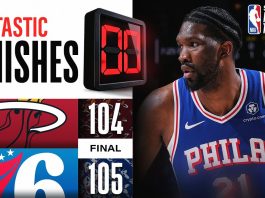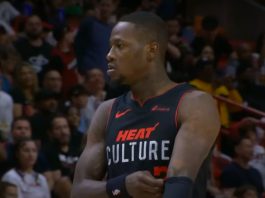Gracefully accepting his NBA Rookie of the Year award, Michael Carter-Williams tried to smile. But unbeknownst to the crowd that witnessed the 23-year-old claim his prize, the Philadelphia 76ers youngster was empty inside.
Only the Milwaukee Bucks [15-67] owned a worse league record than the Sixers in the 2013-14 season, but the 19-63 mark had an accompanying streak that no team dreamed to be partnered with.
On March 27, the Sixers lost 26 consecutive encounters, tying the NBA-record mark set by the Cleveland Cavaliers in the 2010-11 season. This streak gave Carter-Williams an NBA induction that few rookies would want to undergo.
“In the middle of the playoff race, a race we were decidedly not in, it seemed like the entire media spotlight was on us,” Carter-Williams recalls. “And trust me, I get it. We had lost 26 games in a row.
“Of course, our roster had lost a combined 200-plus games to injury and we had used more than 20 different players in the lineup since opening night. That didn’t seem to be a part of the conversation. All anybody was talking about was “tanking.””
If you watch the NBA, then tanking is automatically brought into the conversation amongst supporters. To fans and so-called “experts”, it is a “well known fact” that teams “tank” in order to get a better draft pick for the following season.
Mention tanking to Carter-Williams though and he is more than likely never to speak to you again. Basketball players that get drafted into the NBA work harder than most average people.
They don’t simply go to the gym for an hour-or-two go lift weights and then shoot 100-200 jumpers before heading home to eat, watch a movie and simply go to sleep.
To NBA players, you’re not a “gym rat” unless you are in for nearly two-three hours every day and you’re on a practice court, shooting 3000-4000 jumpers after training was done. To be in the league, you needed to be the janitor or security guard’s worst enemy, as they were the ones standing between you and the exit.
For Carter-Williams, he lived and breathed basketball. He would be up training and doing stations until the early hours. During his freshman year at Syracuse, he would in the gym so late perfecting his dribbling and fundamentals that he would superglue his fingers to prevent them from bleeding.
But all the hard work to prepare him for his first season in an NBA vest could not have readied him for this. Each of the 26 losses felt like a dagger and with each defeat, Carter-Williams’ bed that night, regardless of where he stayed felt colder than a 5-year-old being embraced by their grandmother.
So to all players: Tanking was not a word in their vocabulary. It’s mere make-believe. Something no one would understand unless you’re a professional basketball player.
But Carter-Williams had his therapy. Most players would get back to the gym, some would watch the game-tape, something that would have just pissed the Hamilton Massachusetts native off, but the hard-to-imagine wonders of trash-time television served a useful purpose.
“Every guy in the league deals with losing in his own way,” he explains. “Some come home, turn on the Xbox and try to get revenge on NBA 2K. The vets might watch a movie with the kids or jump in the hyperbaric chamber. The more progressive guys are turning to meditation and yoga.
“I’m too impatient for that stuff. For me, it’s all about Ellen. I just think she’s awesome. So every weekday at 4 p.m., my stepfather and I pause the basketball talk, grab some snacks and watch The Ellen Degeneres Show. It might sound funny, but this is one of the ways I’m able to get away from the frustration of losing.”
And the Ellen treatment took a while to settle in and work its magic but by the time the 27th game against Detroit edged closer, Carter-Williams was hoping that the cure of daytime TV would work. He would be damned if the NBA record books had his team name beside “Longest losing streak in the NBA”.
The game in Philadelphia on March 29, 2014 saw a frenzy of media assemble to the Wells Fargo Centre. Carter-Williams even remembered seeing ESPN’s Stephen A. Smith, a reporter reserved for the big games, including the NBA Finals present. The Sixers’ potential record-breaking streak though was big.
“We knew it was going to be a circus when ESPN flew in Stephen A. Smith to Philadelphia for the 27th game against Detroit,” Carter-Williams says. “In the locker room before shootaround, we got swarmed by reporters. You could barely move around the room.
“Somebody actually asked, ‘So how does it feel to be a part of the most losing team in NBA history?’ Which was really funny because we hadn’t even played the game yet. Everybody just expected us to lose and set the record.
“Here’s the thing: I can understand why the media seized onto the story. My problem is that it was missing a lot of context. We didn’t even have the worst record in the league at the time, but the average person watching on TV probably didn’t know that. “
This motivated the newcomer and the rest of the 76ers as they raced to a 33-23 lead after the first quarter with Carter-Williams at the heart of everything. By the time that the clock was winding down to bring the third quarter to a conclusion, the crowd of 17, 438 pro-Sixers fans rose to its feet. Up 98-68 as the fourth quarter began; they knew that the team had done it.
For Carter-Williams, his smile was broad. He glanced at his team-mates who were for once laughing and joking around, whilst cheering every positive play their team made. It didn’t matter what it was.
As the fourth quarter winded down, and the result was safe enough for journalists to make a start on their opening paragraphs, the guy who was used to winning at Syracuse, but now won a different battle with the Sixers looked around, almost like he was on the hunt for a celebrity sighting.
He was on the hunt for a certain reporter that ESPN sent, in case his team lost.
Stephen A. Smith was gone. The ESPN sticker on press row … vacant.
“We weren’t the story anymore,” Carter-Williams proudly said. “They were on to the next thing. Stephen A. didn’t really stick around. I guess he had a plane to catch. Believe me, I’m going to do everything in my power to make sure he doesn’t come back for the same reason. “
Going to the locker room afterwards was another moment that Carter-Williams and the Sixers won’t forget.
“After the game, a lot of the reporters didn’t even stick around,” Carter-Williams said. “The ones that did weren’t prepared. They didn’t ask us about the specifics of the game. They made up questions on the spot, like, “Uh, hey, you guys won … so how do you feel?’”
It was a question that the team saw coming. Every one of them.
“It’s not something I want to be a part of,” Carter-Williams told the Associated Press, post-game. “So it’s great that we got this win.”
The rookie hit 21 points that night, leading the 76ers scoring in the 123-98 rout of the Pistons. So far it’s arguably the most important haul he’s had in his NBA career.
He wants to be in the NBA record books for something that is remembered, not laughed at.
The quotes from Michael Carter-Williams come courtesy of his own penned article on The Players Tribune of the disastrous two-month period, where the Philadelphia 76ers lost 26 straight games. His entire account can be found here






